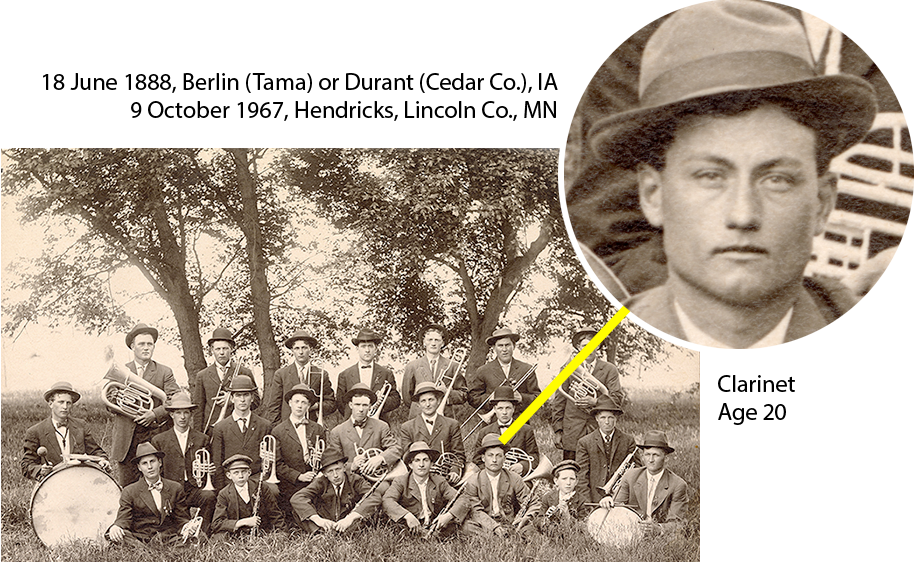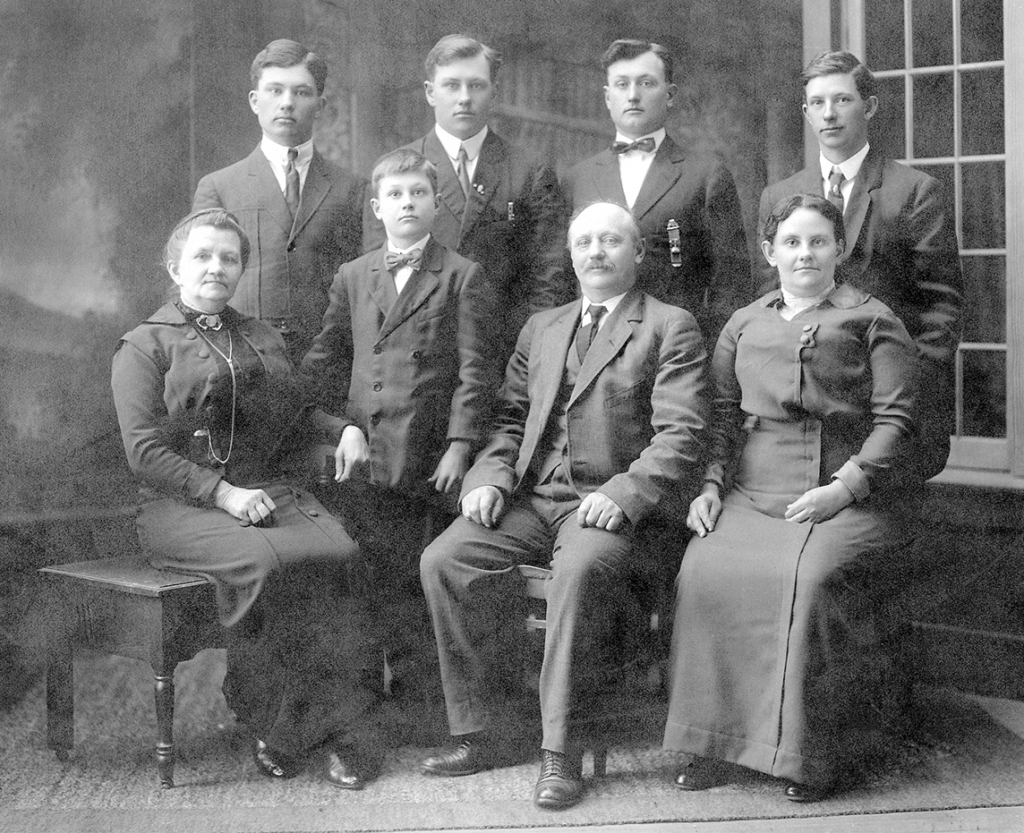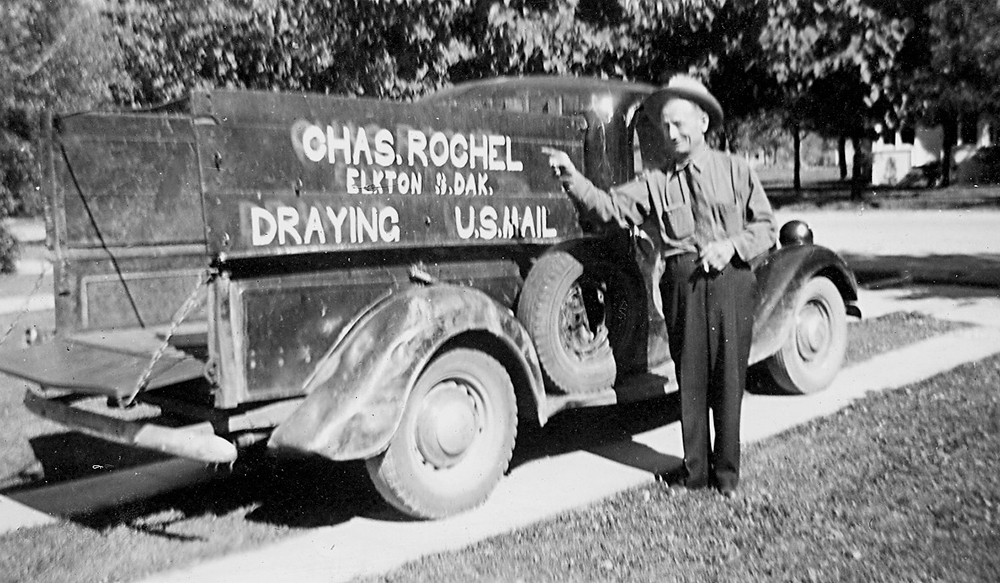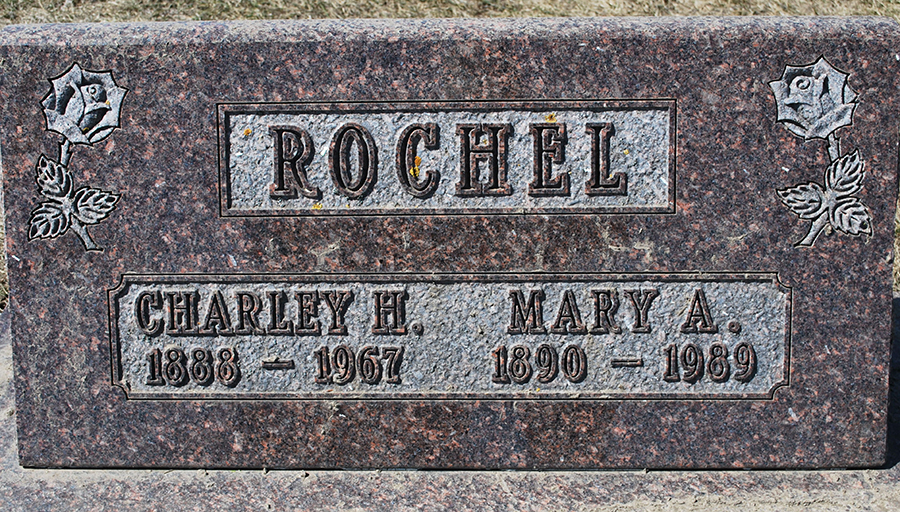
A younger brother to Calumet German Band member Harry Rochel (1883-1965), Charles Rochel(1) (called “Charley”) was the third child in the family of six children of Peter Holmer Rochel (1855-1942) and Maria “Mary” Stahl (1860-1947).(2) Like so many other band members, the family heritage was that of Schleswig-Holstein, where both Peter and Mary had been born. And like other German immigrants of this era, the family settled first near Davenport, Iowa (where the passenger railroad crossed the Mississippi River), then moved on — for a few years living in Tama County, where there was a large German immigrant community, then briefly in the adjacent Grundy County, and then moving to O’Brien County, in northwest Iowa.
The oldest child, Harry, as well as the second, Rosa (1886-1967), were born in Durant (a small town that nevertheless spans three counties — Cedar, Scott, and Muscatine). But Charley’s place of birth is actually somewhat unclear. Although several records state that he also was born in Durant, his marriage record indicates his place of birth as Berlin, in Tama County. This comports with the known dates of the family’s moves across the state, and in itself the town provides an interesting commentary on the experience of German immigrants around the turn of the 20th century, because the town later changed its name in response to anti-German feelings during World War I.(3)
Two more children, John Phillip (1892-1980) and Emil Richard (1894-1972), were also born while the Rochel family lived in east central Iowa, but in 1900 they moved to O’Brien County, where the last child, Rudolph Donald “Rudy” (1901-1981), was born. There, Peter Rochel and his family farmed near the town of Paullina, a few miles away from Calumet, in Union Township, which is where Charley and Harry lived at the time of the band photo.

A handsome portrait of the family was likely taken soon after this time — perhaps on the occasion of Charley’s wedding, on 2 February 1910, eight months after the Calumet German Band photo.
That marriage was to Mary Alvina Wede (1890-1989), who was the younger sister of Lizzie Annie Katherine Wede (1889-1978), who had married Charley’s brother Harry three years previously, in February 1907. Mary Wede had been born in Sutherland, the daughter of Heinrich Fredrick Wede (1861-1953) and Margaretha Ruther (1854-1957(4)), German immigrants who also hailed from Schleswig-Holstein.
The Rochel brothers were not alone among Calumet German Band members who married sisters. William “Willie” Shafer (1888-1954) and Ernest Shafer (1891-1964) also married sisters: Ella Eggers (1892-1990) and Kathrine “Katie” Eggers (1889-1974), respectively. In that case, the Eggers sisters were sisters also to another band member, William “Bill” Eggers (1886-1968). Remarkably, there was a third set of brothers in the band — John Mehrens (1889-1941) and Albert Mehrens (1891-1957) — although the Mehrens brothers did not follow the trend of marrying sisters.
Charley and Mary Alvina established themselves as farmers in Grant Township, to the north of Sutherland and northeast of Calumet. Their first two children, Viola Margaret (1912-1923) and Cleora Marie (1914-1999), were born on the farm or nearby. Sadly, Viola died as an 11-year-old in 1923.
In 1920, the family relocated to a farm near Elkton, Brookings County, South Dakota, where their son Harold (1921-1976) was born, and where Charley farmed for many years, primarily concentrating on dairy operations. This move was part of a move to the region by several family members — initially by Charles’s brother Harry and his young family, who were already farming nearby in 1915, and then by parents Peter and Mary as well as the youngest brother, Rudy. North of Sioux Falls and immediately west of the Minnesota border, Elkton is only some 10 miles away from Lake Benton, Minnesota, where Harry farmed, and also near where Rudy farmed. Both of these small towns are close to the larger town of Pipestone, Minnesota, where the parents Peter and Mary spent their remaining years.

In 1951, Charley retired from farming and moved to the town of Elkton. Later he worked as a drayman and U.S. mail carrier. A photo from this time shows Charley standing beside his truck, marked “Chas. Rochel, Elkton, S. Dak., Draying – U.S. Mail.
The Rochels’ children Cleora and Harold and these two children’s spouses (Chris R. Bessler, 1913-2002, and Geraldine “Gerry” Julia Strubbe, 1923-1992, respectively) continued to live near the parents in South Dakota.

Brothers Charles and Harry Rochel died only two years apart — Harry in 1965 and Charles in 1967. Charles’s wife Mary lived for another 22 years after her husband’s death.
Charley Rochel and Mary Wede Rochel are buried in Elkton City Cemetery, Elkton, South Dakota.

Subscribers to Ancestry.com may wish to further explore some family connections of Charley Rochel by accessing an Ancestry profile page (within the context of a “Mugge Family Tree”).
Connection to Other Band Members
See the biosketch for Charley’s brother Harry Detlaf Rochel (1883-1965). These two brothers are related through direct family associations or in-law connections to fully half of the band members. Among these many connections, the closest are these:
• Charles and Harry Rochel and their bandmate William “Bill” Eggers (1886-1968) are first cousins. The father of Charley and Harry, Peter Holmer Rochel (1855-1942), was a brother of Bill Eggers’s mother, Kathryne “Katie” Rochel (1849-1932).
• Thus there are also in-law cousin connections to bandmates William “Willie” Shafer (1888-1954) and his brother Ernest Shafer (1891-1964), who were married to two sisters of Bill Eggers: Ella Eggers (1892-1990), wife of Willie, and Kathrine Eggers (1889-1974), wife of Ernest.
These connections can be seen in a schematic, available here.
• Through the same Eggers family connection, Charles and Harry are connected to brothers John Mehrens (1889-1941) and Albert Mehrens (1891-1957); another of Bill Eggers’s sisters was Amanda Eggers (1884-1938), whose daughter Alice Meier (1906-1982) married Elmer Mehrens (1897-1955), younger brother of John and Albert. See a schematic of this connection.
And Charley and Harry Rochel are more distantly related to bandmates Charles Bandholz, Henry Friedrichsen, Ralph Langley, Henry Lorenzen, Henry Mugge, and Allie Sohm. Readers who seek more information about these connections may wish to contact John Mugge through the Contact form.
Footnotes
(1) The name was spelled Rochelle on the caption of the photo that The Des Moines Register published in 1964, and it sometimes appears that way in census records, probably the result of error by census enumerators. All important primary sources (naturalization record for Peter Holmer Rochel, marriage records, passport applications, etc.) spell the name as Rochel. The pronunciation, at least in this U.S. wing of the family, is ro-SHELL.
(2) Some of the opening material for this biosketch repeats information that appears on the bio for Charley’s brother, Harry Rochel.
(3) As the U.S. prepared to intervene militarily in WWI on the side of the Allies, in April 1917, and continuing throughout the war, there was a wave of anti-German sentiment and personal violence both nationally and in Iowa, the home to many recent German immigrants. Anti-German feelings ran so high that a proclamation, known as the “Babel Proclamation,” was issued by Iowa Gov. William L. Harding in May 1918, which forbade the speaking of any language in public other than English. There were also more permanent actions nationally, including the renaming of many place names, especially street names in major cities such as Chicago, Cincinnati, and Indianapolis. In the small town of Berlin, which like other areas of Tama County had seen an influx of German immigrants, the wave of verbal and physical abuses against its citizens caused the town to rename itself on 12 June 1918 as Lincoln. See this site’s more extensive discussion of anti-German feelings in “WWI & Anti-German Sentiment,” a subsection of “The Cultural Milieu.”
(4) Note that Margaretha Ruther lived to the very advanced age of 102. She and Heinrich Wede were able to celebrate their 68th wedding anniversary shortly before his death. Upon her own death, Margaretha was survived by 14 grandchildren, 52 great-grandchildren, and 10 great-great-grandchildren.
